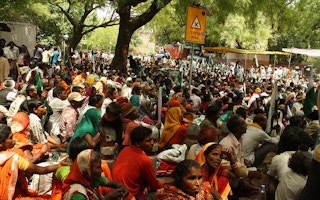An Indian activist who helped to set up a human rights group campaigning for the eradication of manual scavenging, a euphemism for disposing of faeces by hand, was awarded Asia’s equivalent of the Nobel prize on Wednesday.
The Ramon Magsaysay Award Foundation named Bezwada Wilson one of six winners this year, citing his “moral energy and prodigious skill in leading a grassroots movement to eradicate the degrading servitude of manual scavenging in India”.
Disposing of faeces from dry toilets and open drains by hand to be carried on the head in baskets to disposal sites, has long been an occupation thrust upon members of the Dalit group, traditionally the lowest ranked in India’s caste system.
At least 90 per cent of India’s estimated one million manual scavengers are women, a hereditary occupation involving 180,000 Dalit households cleaning the more than 700,000 public and private dry latrines across the country.
Wilson, 50, whose own family had been engaged in manual scavenging for generations, said the award was recognition for women workers who had said no to scavenging.
“
Nobody gets into a septic tank or sewer line because they want to and knowing that they could die, but deaths are increasing and that reality cannot be ignored.
Bezwada Wilson, Indian activist and Ramon Magsaysay Award Foundation 2016 awardee
“The struggle is at the ground level and the challenge is to overthrow a deeply caste ridden attitude,” Wilson told the Thomson Reuters Foundation in an interview.
“The real heroes are the women who organised themselves, questioned the practice and understood that no one is born into such forms of exploitation,” he added.
Wilson was spared from manual scavenging to be the first in his family to pursue higher education, the Manila-based Ramon Magsaysay Award Foundation said.
He went on to recruit volunteers for what would become Safai Karmachari Andolan, a movement of manual scavengers and their children. Started in 1995, it has since grown into a national movement spread over 25 states of India.
“Nobody gets into a septic tank or sewer line because they want to and knowing that they could die,” Wilson said. “But deaths are increasing and that reality cannot be ignored.”
India, which banned caste-based discrimination in 1955, has passed several laws to end manual scavenging with government pledges to modernise sanitation and criminalise those who employ manual scavengers.
Legislation passed in December further tightened penalties.
“There is a ban but there is no enforcement of it,” Wilson said.
“Cases need to be filed against people who encourage this practice. If the law is enforced, manual scavenging can be eradicated in a short time.”
This story was published with permission from Thomson Reuters Foundation, the charitable arm of Thomson Reuters, that covers humanitarian news, women’s rights, trafficking and climate change. Visit www.trust.org










